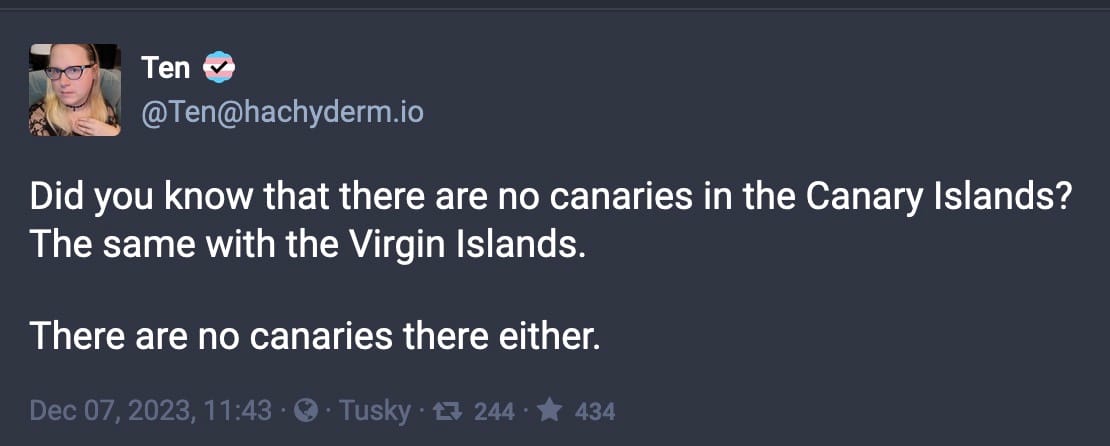Updates from Adam Isacson (December 11, 2023)
Hi, this is Adam. If you're receiving this message, it means you signed up on my website to receive regular updates. If you'd like to stop getting these, just follow the instructions further down.
As I warned in my last note, there's less to read in this week's edition because my "writing short things" time got used up drafting the first of two reports about my October-November visit to Colombia. (It's about two-thirds drafted but I've got a few hours left.)
In addition to that, we're staying on top of the negotiations in Congress (especially the Senate) that threaten to weaken decades-old human rights protections for migrants, because that's the Republican legislators' condition for approving Ukraine aid. Those developments—in super-brief format—are in the daily border links posted to my site, and in an archive at WOLA's "Border Oversight" page. Today's is below.
This week's e-mail has links to the weekly border update, links to a few recommended articles, and links to upcoming events.
Weekly U.S.-Mexico Border Update: December 8, 2023
Read the whole update at WOLA's website.
THIS WEEK IN BRIEF:
- Republicans put border and migration at the center of Ukraine supplemental budget debate
Legislators have hit an impasse over the Biden administration’s request for $110.5 billion in additional funding for Ukraine, Israel, the border, and other priorities. In exchange for their support, Republicans are demanding tougher border and migration measures, including some that could put asylum and humanitarian parole out of reach for many. Talks between a small group of senators have broken down, a “test vote” in the full Senate failed, and the tone is acrimonious.
- Migrant arrivals rising again along the border
Border Patrol apprehended more than 10,000 migrants on December 5, one of the highest daily counts ever. A September-to-October dip in migrant arrivals has reversed. Large groups are waiting, at times for days in poor humanitarian conditions, in Border Patrol’s sectors in Tucson, Arizona; Del Rio, Texas; and San Diego, California.
- Reports examine increasing migration from China
U.S. authorities encountered over 28,000 citizens of China at the U.S.-Mexico border over the 12 months ending in October, a more than tenfold increase over the previous 12 months, with more than 8,000 arriving in September and October. Most are coming to San Diego. People who flee China tend to be middle class or lower middle class. They are escaping persecution but also cite fears of falling into poverty as the world’s second-largest economy falters.
Daily Border Links: December 11, 2023
Developments
In talks that resumed on December 7, Senate negotiators appear to have made little progress toward a deal that could win Republican support for the Biden administration’s request for $110.5 million for Ukraine, Israel, and other priorities. As the price for their votes, Republicans are demanding changes to U.S. law that would reduce access to asylum, humanitarian parole, and similar migrant protections.
- Rebecca Santana, “Major Changes to Us Immigration Policy Are Under Discussion. What Are They and What Could They Mean?” (Associated Press, Associated Press, December 10, 2023).
- Ted Hesson, “White House to Intensify Push for Ukraine Aid and Border Security Deal” (Reuters, Reuters, December 10, 2023).
- Burgess Everett, Jennifer Haberkorn, Jonathan Lemire, “Biden the Closer? Senate Gop Urges President to Clinch Ukraine-Border Deal” (Politico, December 8, 2023).
- Stuart Anderson, “Analysis of Immigration Issues in Border Talks Shows High Stakes” (Forbes, December 10, 2023).
“First thing’s first is asylum,” Sen. James Lankford (R-Oklahoma), the chief Republican negotiator on a possible deal, told Face the Nation. “Right now, people come in and say, I want to request asylum. There’s so many people, and the cartels know it, and the smugglers know, that they can throw thousands of people a day. There’s no way to process that.”
- “Full Transcript Of “Face the Nation,” Dec. 10, 2023” (CBS News, December 10, 2023).
“Three sources with knowledge of the talks” told NBC News that, with White House involvement, negotiators are near agreement on raising the standard of “credible fear” that asylum seekers must meet in initial screening interviews at the border. This proposal outrages migrant rights defenders because of the risk that many asylum seekers may be sent back to danger. On Meet the Press, the Democrats’ chief negotiator, Sen. Chris Murphy (D-Connecticut), said, “We are willing to talk about tightening some of the rules, so that you don’t have 10,000 people arriving a day. Our resources are not equipped to be able to handle that number of people. So, let’s reduce the number of people who are coming here, but let’s not shut down the border completely to legitimate claims.”
- “Meet the Press – December 10, 2023” (NBC News, December 10, 2023).
- “#WelcomeWithDignity Rejects Efforts to End Asylum” (#WelcomeWithDignity Campaign, December 8, 2023).
“Three sources with knowledge of the talks” tell NBC News that Republicans are also calling to restrict use of the presidential “humanitarian parole” authority, which dates back to the 1950s, except for Cuban migrants. Other possible Republican demands, CNN reported, may include more electronic monitoring of asylum seekers, including children, released into the United States, and sending more asylum seekers to “safe third countries.”
- Julia Ainsley, Julie Tsirkin, Monica Alba, Sahil Kapur, “Congressional Hispanic Caucus Frustrated With the White House on Immigration Negotiations” (NBC News, December 10, 2023).
- Lauren Fox, Priscilla Alvarez, “Daylight Remains Between Democrats and Republicans Over Border Policy Changes, Sources Say” (CNN, December 8, 2023).
CBP’s port of entry in remote Lukeville, Arizona remains closed, as the border crossing’s personnel have been pulled away to help process daily arrivals of asylum seekers and other migrants in Border Patrol’s Tucson sector, where agents apprehended 18,900 people during the week ending December 7 (2,700 per day). “Because Lukeville is so remote, Border Patrol staffing is light, so traffickers in the region controlled by Mexico’s Sinaloa cartel steer people there,” the Associated Press noted.
- “John R. Modlin @Usbpchieftca on Twitter” (Twitter, December 8, 2023).
- Anita Snow, “Smugglers Are Bringing Migrants to a Remote Arizona Border Crossing, Overwhelming Us Agents” (Associated Press, Associated Press, December 10, 2023).
- Camilo Montoya-Galvez, “Migrants From Around the World Converge on Remote Arizona Desert, Fueling Humanitarian Crisis at the Border” (CBS News, December 8, 2023).
- Jack Healy, Miriam Jordan, “To Handle a Surge of Illegal Crossings, Border Officials Stop Legal Ones” (The New York Times, December 10, 2023).
Arizona Gov. Katie Hobbs (D) visited the Lukeville area and called for the border crossing’s reopening and pledging to deploy the state’s National Guard if the situation continues. Hobbs sent President Joe Biden a letter calling for “$512,529,333 in reimbursements for ongoing border operations resulting from the federal government’s failure to secure the Arizona border.”
- “Governor Katie Hobbs Launches Operation Secure, Offers National Guard Mobilization to Open Lukeville Port of Entry” (Office of the Governor of Arizona, December 8, 2023).
- Marissa Sarbak, “Arizona Gov. Katie Hobbs Visits U.S.-Mexico Border at Closed Lukeville Port of Entry” (FOX 10 Phoenix, December 9, 2023).
- Paul Ingram, “Frustration for Ajo With Lukeville Border Crossing Closed; Hobbs Looks to Nat’l Guard” (The Tucson Sentinel (Tucson Arizona), December 8, 2023).
The five-day average of migrant arrivals (3,407) is even higher in Border Patrol’s Del Rio, Texas sector where—despite a massive array of border security measures laid out by the state government’s “Operation Lone Star”—Border Patrol apprehended 17,034 people in five days.
- “Acting Chief Patrol Agent Juan G. Bernal @USBPChiefDRT on Twitter” (Twitter, December 7, 2023).
- Camelia Munoz, “Ola Migrante Inunda Piedras Negras; Por Esta Razon Temen Crisis Comercial en la Frontera” (Proceso (Mexico), December 8, 2023).
Near Jacumba Hot Springs, California, just over an hour’s drive east of San Diego, “a total daily average of 800 people are in three camps,” Agence France-Presse reported.
- “‘A New Normal’: Migrants Huddle in Open-Air Camps on Us Border” (Agence France Presse, France24 (France), December 8, 2023).
A CBS News poll finds 20 percent of U.S. respondents naming “immigration and the Border” to be the “most important problem facing the United States.” Only “inflation” (27 percent) scored higher.
- Anthony Salvanto, Fred Backus, Jennifer de Pinto, “Most Americans Disapprove of Biden’s Handling of Israel-Hamas War — Cbs News Poll” (CBS News, December 10, 2023).
Although Mexico’s migration agency (INM) is reportedly out of money for deportations and travel for what remains of 2023, the agency returned 47 unaccompanied Guatemalan minors back to Guatemala over the December 9-10 weekend. Still, news of Mexico’s suspension of deportations may be encouraging migrants, like some interviewed by the daily Milenio, to speed their progress across the country.
- “Inm Realizo el Retorno Asistido de 47 Nna No Acompanados de Nacionalidad Guatemalteca” (Instituto Nacional de Migración (Mexico), December 10, 2023).
- Fluvio Cesar Martinez, “Migrantes Aceleraran su Ruta para Llegar a-Eu Suspension Deportaciones” (Milenio (Mexico), December 10, 2023).
San Diego U.S. District Court Judge Dana Sabraw approved a court settlement, in litigation brought by the ACLU, that would prohibit any revival of a “family separation” policy at the U.S.-Mexico border for the next eight years.
- Camilo Montoya-Galvez, “Judge Approves Settlement Barring U.S. Border Officials From Reviving Family Separation Policy for 8 Years” (CBS News, December 9, 2023).
- Elliot Spagat, “Federal Judge Poised to Prohibit Separating Migrant Families at Us Border for 8 Years” (Associated Press, Associated Press, December 8, 2023).
Analyses and Feature Stories
CBP’s Office of Professional Responsibility released an annual report, covering 2022, about internal investigations and employee accountability. The report found no increase in disciplinary actions taken against agency personnel compared to 2021. The National Use of Force Review Board looked at five serious use-of-force incidents and recommended no discipline.
- “Report on Internal Investigations and Employee Accountability fy2022” (U.S. Customs and Border Protection, December 8, 2023).
The Ciudad Juárez-based La Verdad reported from several parts of Mexico about the severe toll that migrating across Mexico takes on women.
- Alicia Fernandez, “El Invisible Martirio de las Mujeres Migrantes” (La Verdad (Ciudad Juarez Mexico), December 10, 2023).
A Washington Post editorial called for more processing of migrants and more assistance to countries along the U.S.-bound migration route that could be giving in-transit migrants greater opportunity to settle there.
- “Editorial: An Immigration Solution South of the Border” (The Washington Post, December 8, 2023).
On the Right
- “Southwest Border Sector Chiefs Describe Their New Policies of Mass Release Under Secretary Mayorkas’ Catch-and-Release Policies” (House Committee on Homeland Security, U.S. House of Representatives, December 8, 2023).
- Ross Douthat, “Why Biden Should Make an Immigration Deal With Republicans” (The New York Times, December 9, 2023).
Countries’ Options for Migrants Passing Through
I like this Washington Post editorial (not only because I’m mentioned) because it wrestles with one of the thorniest questions facing Latin America.

When large numbers of migrants are passing through your territory, how do you manage it in a way that’s not so “zero tolerance” that it strands thousands and creates a bonanza for organized crime, but that’s not so tolerant that the U.S. government comes down hard on you for “green-lighting” migrants passing through?
I struggled with those options a bit in a post a couple of months ago, and it makes up much of the “recommendations” section of the Colombia report I’m writing right now. I appreciate the way the Post editorial lays out these lousy choices and what countries can do (integration of migrants, coordination with each other) to “make the U.S. government OK with it” if they legalize and manage in-transit migration instead of pushing it into the shadows.
Links from the Past Week
Sarah Kinosian, How a Factory City in Wisconsin Fed Military-Grade Weapons to a Mexican Cartel (Reuters, Reuters, Saturday, December 9, 2023).
A single sniper rifle led investigators to a syndicate deep in the United States that armed Mexico’s fentanyl-trafficking Jalisco New Generation Cartel
David C. Adams, Ernesto Londono, Frances Robles, Ex-U.S. Ambassador Accused of Being a Cuban Agent Rose From Humble Origins (The New York Times, Friday, December 8, 2023).
Former colleagues are struggling to separate fact from deception as they reconsider Manuel Rocha, who was accused of being a Cuban agent for decades
Report on Internal Investigations and Employee Accountability fy2022 (U.S. Customs and Border Protection, Friday, December 8, 2023).
This report describes the process from intake through outcome and provides key statistics on the intake, investigative activity, and discipline taken against CBP employees for the time period from Oct. 1, 2021, through Sept. 30, 2022
Lauren Villagran, 'It's Heartbreaking': Day After Day, New Mexico Investigator Recovers Migrant Remains (The El Paso Times, Thursday, December 7, 2023).
A surge in deaths of women accounted for most of the increase, doubling from last year and more than tripling from 2021
El Salvador's (Perpetual) State of Emergency: How Bukele's Government Overpowered Gangs (InsightCrime, Wednesday, December 6, 2023).
This six-part investigation looks at how the Bukele government’s crackdown succeeded in overpowering El Salvador's main gangs
Latin America-Related Events in Washington and Online This Week
(Events that I know of, anyway. All times are U.S. Eastern. There's less happening as we head into the end of the year.)
Monday, December 11
- 5:00-6:30 at Columbia University Zoom: Guatemala: Democracy in the Crosshairs (RSVP required).
Tuesday, December 12
- 1:00-2:00 at Refugees International Zoom: A Better Approach Toward Reception of People Seeking Asylum (RSVP required).
Wednesday, December 13
- 10:00-11:15 at aei.org: Should Argentina Dollarize? (RSVP required).
- 12:00-2:00 at House of Sweden: The Global State of Democracy: Presentation of International IDEA’s 2023 Report (RSVP required).
Photo

And Finally




